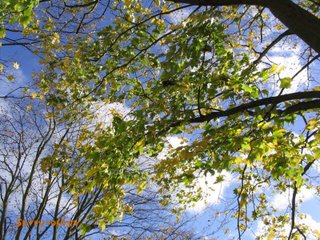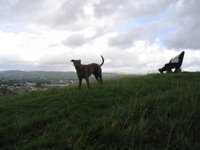
The Lake District, 17-19 September 2006: Levens Hall
It's been a while after my trip to the Lake District. Endless travelogues, it seems.
When I was there, it was the end of the summer, and it's autum now (sigh... this lament is a sign of senility.)
Yes, autumn has been around for a while. These days whenever I have a chance to step on the gorgeous orange carpet--a seasonal mantle of the earth woven from golden leaves--the crackling under my feet is very comforting, assuring, even though I also bear in mind a melancholic notion that this path is leading the year to an end, and the cycle of nature to winter.
Around this same time two years ago, when waiting for bus in front of Heslington Hall, I chanced to "hear" a squirrel crossing a field covered with fallen leaves. It made me giggle. : )
A lady sitting on the same bench smiled and said, 'isn't that lovely! It's my favorite time of the year!'
This year the crispy sound constantly recalls to me rustling of green leaves in Levens Hall this summer.
Levens Hall is a 19th-century house especially known for its magnificent gardening.
I only visited the garden.
It was a very comfortable and peaceful experience. Astounding experience too! It must have taken incredible efforts to maintain this huge garden since two centuries ago.
One essential design of the garden contains some spaces that are walled by well-trimmed bushes. It almost looks like a labyrinth.
Standing between the walls of bushes was an intimidating audio experience to me.
I heard nothing but the rustling of leaves.
The sound was so close to the ear that it silenced me.
The rustling was so close and so intense that I was getting nervous.
The sound was so close, so intense, and so unfamiliar that I was led to suspect if there were creatures lying in ambush.
The sound was curiously inviting, I was almost tempted to sneak into the narrow path.
But the sound was also disquieting, so monotonously powerful and overpowering.
I hesitated and, took another route.
I know, it's nothing but wind rustling through leaves as if glasses are chattering.










